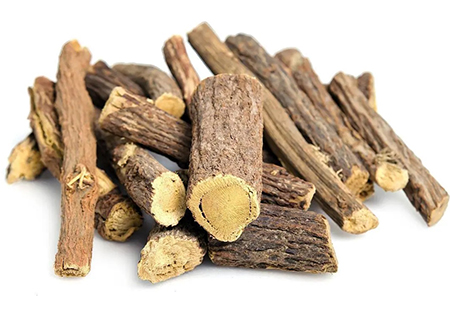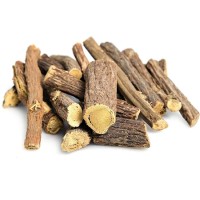Can licorice extract glycyrrhizin be used as a sweetener?
One of the primary concerns with glycyrrhizin is its potential impact on health. While it does provide sweetness without the added calories of sugar, glycyrrhizin has been associated with certain health risks when consumed in large quantities.
Licorice root extract glycyrrhizin, has been used traditionally as a sweetening agent for centuries. Glycyrrhizin is approximately 50 times sweeter than sucrose, making it an attractive option for use as a sweetener in various food and beverage products. However, there are several considerations to take into account when evaluating the use of glycyrrhizin as a sweetener.
One of the primary concerns with glycyrrhizin is its potential impact on health. While it does provide sweetness without the added calories of sugar, glycyrrhizin has been associated with certain health risks when consumed in large quantities. Prolonged or excessive consumption of glycyrrhizin has been linked to negative effects on blood pressure, potassium levels, and hormonal balance. As a result, regulatory authorities in some countries have imposed limits on the amount of glycyrrhizin that can be used in food products.
Furthermore, the taste of glycyrrhizin may not appeal to all consumers. Its distinct flavor, which is characteristic of licorice, may limit its application as a sweetener in certain products. While some individuals enjoy the taste of licorice, others may find it off-putting. This could pose a challenge for food and beverage manufacturers seeking to appeal to a broad consumer base.

In addition, there are regulatory considerations that must be taken into account when using glycyrrhizin as a sweetener. In the United States, for example, glycyrrhizin is classified as "generally recognized as safe" (GRAS) for use in food products when consumed in moderate amounts. However, the specific regulations governing its use vary by country and region. Food and beverage companies need to familiarize themselves with the relevant regulations and ensure compliance when utilizing glycyrrhizin as a sweetening agent.
Despite these challenges, there may still be opportunities for glycyrrhizin powder to be used as a sweetener in certain niche products or markets. Its intense sweetness and unique flavor profile could make it well-suited for specific applications, such as herbal teas, confectionery, or traditional medicinal products where its taste is desirable.
In conclusion, while glycyrrhizin powder from licorice extract does offer significant sweetness and has been used historically as a natural sweetener, there are important factors to consider before incorporating it into food and beverage products. Health concerns, taste preferences, and regulatory requirements all play a role in determining the suitability of glycyrrhizin as a sweetening agent. As with any ingredient, thorough evaluation and consideration of these factors are essential before deciding to use glycyrrhizin as a sweetener.














